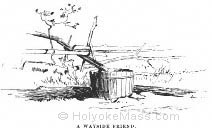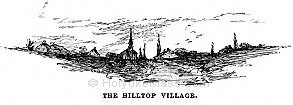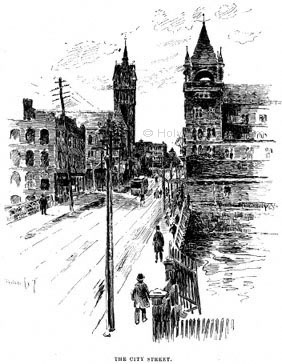In New York City, amid the whirl of sights and sounds, the elevated railways are a prominent feature, both to eye and ear. With short intervals between, the trains rush and rattle, along the iron rails overhead from long before daylight till midnight following. To most, this almost ceaseless noise and clatter would seem a great nuisance. But there may, nevertheless, be some poetry in it.
A friend once said to me: "I like to hear those elevated trains. It sounds as if things were driving and lots was going on. They rush as if they were in a hurry. When I come back after a stay in the country, that’s one of the pleasantest sounds I know of."

Each of the two finds charm in the farthest extreme from what is the liking of the other. Which one was right? Is the country dull? Is the city typical of only noise and confusion? Or, is harmonious repose and quiet comfort characteristic of country life, and sights, and briskness and vitality of the city? Probably neither and both; for life anywhere runs a twisted current, and gains and drawbacks at no time part company. As natures differ, so the things that interest and touch them differ, and there are many blanks to each of us which are only so because our eyes do not see.
It is told of that famous lover of the country, Thoreau, that if other employment failed, he could sit down in the woods wherever he happened to be and at whatever season and spend an hour in interested and absorbed observation of things close about
Even then he had not exhausted his subject or noted all worth seeing. He knew the language of plants and trees, and all the little animals of the fields and woods. He learned many things from them. He listened too to the voices of the brooks, and of the winds and storms, and watched with ever renewed interest the changing seasons.

There are as well, lovers of the town, who delight in its brick walled streets and its thronging life. They are proud of its big mills and handsome residences, and are happy in a saunter along the smooth-paved walks, or in the winding paths of the parks. The alleys and by-ways even have charm, and a way strewn with torn papers and other litter, which every wind sets in eddying motion, and where ragged, dirty-faced children jostle him, and the odors which greet his nostrils are far from fragrant—this may please him more than the most beautiful landscape in the world.
Thoreau could find delight in poking about a mud hole in a swamp. The lover of the town could find happiness in rambling through the dingiest city alley. Each of the two showed a depth of sympathy in his special direction that is well worth cultivating.
|
City Life and movement, with all its turmoil of pain and pleasure, its luxury and poverty, is intensely interesting. Country life, simply as life, is interesting too. You see much less than is seen in the same space in the city, but struggle and success and hardship are mingled there just as in the larger place. But nature sings in the country more freely. Wind and sunshine are untrammeled. The roads wind along as the lay of the land dictates. There are green fields everywhere. Brooks follow down every hollow.
Nature hovers about in the city atmosphere too. She makes pictures in the clouds, and with the coming and going of the sun paints the skies each morning and each evening. Sometimes she filters the air to crystal clearness, and again softens every visits of the streets with delicate tones of blue; or again will veil all in a mysterious mist of fog. When, with the winter frosts, a snowstorm comes, the city takes on a still different aspect, and in some ways is never more charming.

One who reads, travels in imagination with the one who writes. Those who look at pictures are themselves, for the time being, with the artist who made them. Together, then, we shall take many rambles about the city streets, and we will linger and admire the comfortable homes of the well-to-do and the handsome mansions of the wealthy, and we will take leisurely walks through the parks and among the green fields on the outskirts. At the same time, we will not neglect the noisier ways of business, and the mill neighborhoods and the streets where are the crowded tenements of the poor. Each is a part of our great world of life, and has charm or significance which merits study.
Finally we will leave the city, and take a long drive over the plains and hills. Many times we shall be entirely out of sight of dwellings and people, and have only the trees and fields and skies for company. Yet these have their voices, and it is not solitude; and even if there comes a touch of loneliness, in old Massachusetts you never get far from habitations, and the little villages on hilltop or in hollow are to be found on every roadway at intervals of a few miles.
Now the introductory word has been said, and we are ready to start.
|